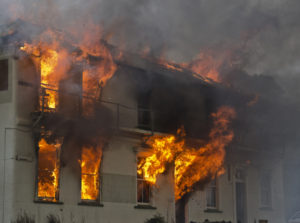 Hurricane season is a big deal for Houstonians. We know when it is, we prepare for it, and we actively watch for updates on the news. This year has been the most active hurricane season in a long time, and it’s probably safe to say we will all be happy to see it end. But what happens right after hurricane season is something that not many people know about — fire season.
Hurricane season is a big deal for Houstonians. We know when it is, we prepare for it, and we actively watch for updates on the news. This year has been the most active hurricane season in a long time, and it’s probably safe to say we will all be happy to see it end. But what happens right after hurricane season is something that not many people know about — fire season.
Fire season starts in the right around Halloween, and continues throughout the next year, typically lasting until March. According to National Fire Incident Reporting System (NFIRS):
“As weather and human activities change with the seasons of the year, so do the incidence, causes, and severity of fires. Winter weather increases indoor activities and the need for heating, which brings about the peak period of heating structure fires. The incidence of daily fires increases during and around four holiday periods: Independence Day, Halloween, Thanksgiving, and the winter holiday period that includes Christmas and New Year’s.”
So why are there more fires during these months? There are several reasons why:
Less rain. After hurricane season ends, we see less rainfall. Because of the lack of rain, the ground becomes dry, along with all the foliage. As trees and grass start to dry out, they become flammable. For example, if you start a fire in an outdoor grill or a firepit and something goes wrong, that fire can quickly spread because of the dead grass. And these types of fires can become out of control very fast. An example of this would be the California wine country fires. Because the ground was dry, the fires have spread quickly, causing devastating damage.
More indoor time. During the fall and winter, temperatures drop. When it gets cooler outside, people tend to spend more time indoors. More indoor activity leads to more chances of having a fire-related accident.
Holiday decorations. During the holidays, really from Halloween through New Year’s, lights and decorations fill homes and offices. Aesthetically, it’s beautiful, but in terms of fire safety it can be very dangerous. Outlets become overloaded, candles are lit for hours at a time, and fires are built inside. According to ESFI Holiday Data and Statistics in 2015, holiday related fires caused an annual average of 8 deaths, 54 injuries, and $19.1 million in property damage. Christmas tree and holiday decoration fires result in twice the injuries and 5 times more fatalities per fire than the average winter holiday fire.
Heaters. It doesn’t take much drop in temperature to prompt Texans to turn on the heaters in the home and office. Space heaters are common inside offices. Many people bring a portable space heater to work to keep extra warm during the workday, and this can be very dangerous. The National Fire Protection Association (NFPA) provides some figures about the dangers of space heaters during fire season:
- Space heaters, whether portable or stationary, accounted for two of every five (40%) of home and office heating fires and four out of five (84%) of home and office heating fire deaths.
The leading factor contributing to heating fires (30%) was failure to clean, principally creosote from solid-fueled heating equipment, primarily chimneys. - Placing things that can burn too close to heating equipment or placing heating equipment too close to things that can burn, such as upholstered furniture, clothing, mattress, bedding, or office supplies was the leading factor contributing to ignition in fatal heating fires and accounted for more than half (56%) of home and office heating fire deaths.
- Nearly half (49%) of all home and office heating fires occurred in December, January and February.
Because fire hazards are all over the place during fire season, it’s important to take the proper steps to prevent a fire from happening. By following the tips listed below from the NFPA, you can greatly reduce your chances of having a fire at your home or office:
- Follow manufacturer’s’ recommendations for maximum volt/wattage load for surge protectors, power strips and adapters, and ask your electrician to periodically inspect these items and outlets for potential overload
- Replace frayed power cords; never run them under rugs or carpeting; use cord protectors instead
Unplug appliances (coffeemakers, microwaves) and other equipment not in use at the end of the day and over the weekend - Replace appliances that feel warm or hot to touch
- Ask the fire marshal to inspect chemical and equipment storage areas periodically to ensure proper ventilation and stowage
- Store hazardous materials according to manufacturer’s instructions and OSHA regulations. Clearly mark these items to help emergency personnel identify and stabilize them
- Don’t prop fire doors open or block exits with furniture or boxes
- Don’t allow paper and other trash to accumulate outside of garbage or recycling receptacles, and never store this material near hot equipment, electrical outlets or smoking areas
- Don’t permit employees to burn candles, scented oils, etc., even in their personal work areas
Fire season is almost here, but if you stay vigilant and prepare your home and office accordingly, you will greatly reduce your risk of having a fire. But if your office or commercial property does suffer from smoke or fire damage this season, remember to give us a call.
